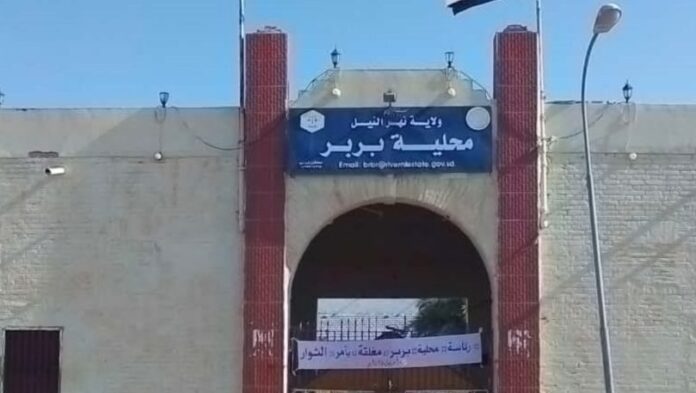In a striking development reflecting rising local tensions over land distribution policies, the city of Berber in Sudan’s River Nile State witnessed large-scale demonstrations on Saturday, October 25, 2025. Crowds of residents and tribal groups marched through the streets before gathering in a public square to protest the government’s decision to allocate large tracts of land east of the city for investment projects.
The demonstrations followed a statement published by the Voice of the Nile platform, in which protesters rejected what they described as the government’s “encroachment of investment interests at the expense of urban expansion and residents’ rights to housing and basic services.”
Urban Expansion Crisis
According to the statement, the protest procession moved through Berber’s main streets toward Al-Ikhlas Square, where participants voiced their opposition to government policies that have led to severe urban congestion. Protesters argued that the city has become geographically trapped between the Nile River to the east and the Abu Hamed road to the west—essentially closing off avenues for urban growth. They warned that this situation threatens Berber’s future and limits its ability to absorb population growth in the absence of clear planning for expansion or viable alternatives for residential areas.
The statement also highlighted a growing housing crisis, noting that residents had submitted around 15,000 requests for residential plots since 2008 without approval from authorities. It further pointed to acute shortages of burial grounds within the city, underscoring how government investment policies have consumed available land without accounting for essential community needs. These conditions, residents said, have compelled them to escalate protests and demand a fairer redistribution of land that prioritizes social equity.
Investment Expansion and Environmental Concerns
In recent years, River Nile State has witnessed a major surge in agricultural and horticultural investments, driven by fertile soil and proximity to the Nile. This boom has attracted both local and foreign companies acquiring vast land tracts, turning large portions of the state into zones for livestock fodder cultivation.
Despite the economic activity, agricultural experts have warned that these projects are depleting underground water reserves through excessive and unregulated resource extraction, posing serious risks to the region’s environmental balance.
Unmet Promises of Development
Although investment projects have expanded widely across River Nile and northern Sudan, local residents say the economic benefits have failed to reach them. Community committees led by farmers accuse the authorities of systematically marginalizing indigenous populations and excluding them from decisions on land use.
These groups are calling for a comprehensive review of current investment policies to ensure that local communities benefit from natural resources and that a sustainable balance is restored between economic development and social justice.


